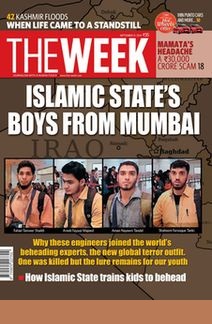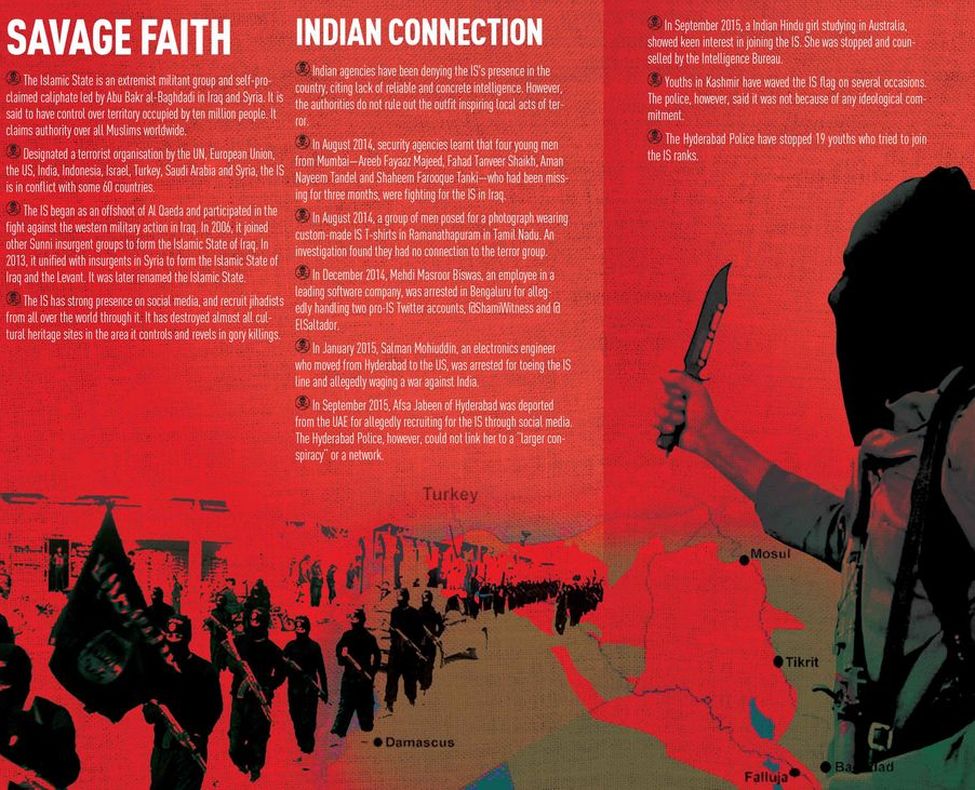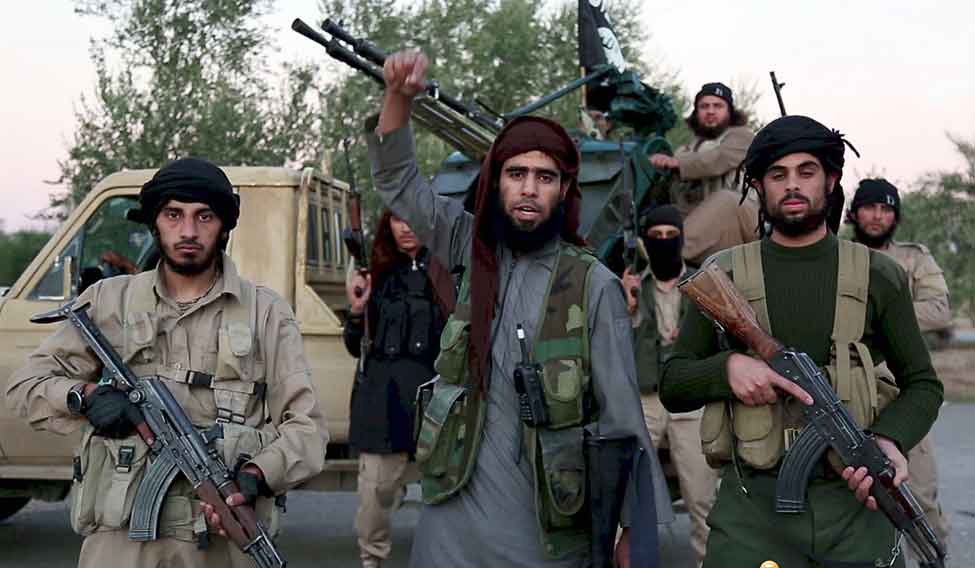When the Islamic State seized Mosul, Iraq's second largest city, in June 2014, it worried the western powers, as the terrorist organisation was turning out to be more brutal and ambitious than global terrorism's flag-bearer, Al Qaeda. India, being a natural target of Islamic terrorists, should also have worried, but the smug Indian security establishment brushed it aside as a distant threat.
In August 2014, the security agencies learnt that four young men from Mumbai—Areeb Fayaaz Majeed, Fahad Tanveer Shaikh, Aman Nayeem Tandel and Shaheem Farooque Tanki—who had been missing for three months, were fighting for the IS in Iraq. What was perceived as a distant threat suddenly was at the doorstep. And, the attack in Paris on November 13, which was strikingly similar to the 2008 Mumbai terrorist attacks, was a rude reminder to India what the IS was capable of.
Lacking reliable and concrete intelligence, Indian agencies have been stuck in denial about the IS's presence in India. They argued that Al Qaeda had failed to make any impact in India despite several attempts, and claimed that the IS, too, would fail likewise.
 THE WEEK cover story (September 21, 2014) on four Mumbai youths leaving home to join the IS.
THE WEEK cover story (September 21, 2014) on four Mumbai youths leaving home to join the IS.
After the Paris attack, however, there has been a slight deviation from this notion. The home ministry's latest advisory to states and Union Territories, for instance, seems to be a wake-up call for the security and intelligence agencies. The advisory says the Islamic State's “success in radicalising some youth and attracting certain sections of the local population or Indian diaspora to physically participate in its activities, or the possibility of piggy-backing on terrorist groups operating in India, have opened up the possibility of ISIS-sponsored terrorist action on Indian territory.” It seems an admission that there are chances of IS-inspired local violence.
Since the IS is on a global roll, says a source in the security establishment, it is important to mark the 'broader dynamic of jihad' and understand that it is spearheading a concerted effort. This calls for reassessing the threat to India, especially since the country can become a recruitment ground. “IS, like any other terrorist organisation, has been recruiting people,” Ashok Prasad, special secretary (internal security), told THE WEEK. “And, whenever they have got people from India we have taken counter actions.”
Jihadi groups have always considered the Indian subcontinent a fertile ground for growth. The added appeal of the IS as the most feared terrorist outfit can attract the radicalised youth in the region to it. Also, the Tehrik-i-Taliban Pakistan, unlike the Taliban in Afghanistan, has not ruled out an association with the IS. These factors should worry India.
In fact, the arrests of Mehdi Masroor Biswas in Bengaluru and Afsa Jabeen in Hyderabad show radicalisation with an alignment for the IS cause. While Jabeen allegedly recruited fighters online for the IS, Biswas fell prey to the outfit's social media campaign. He was arrested after the police found he had two Twitter handles which were pro-IS. Former Bengaluru police commissioner M.N. Reddi, however, said Biswas only translated Arabic texts and was “kind of straight” in his pursuits.
Also read: Four Mumbai youths leaving home to join the IS
Jabeen, who was deported from the UAE, allegedly used social media tools to recruit for the IS. But her efforts did not mean much. The Hyderbad Police could not link her to a “larger conspiracy” or a network that that addressed the “human resource requirements” of the IS. “However, there is no discounting the fact that the lure remains. Also we don't know for sure what role certain families play in 'preparing' these young minds for a certain journey,” said an intelligence officer.

Salman Mohiuddin, an electronics engineer who moved from Hyderabad to the US, allegedly wanted to wage war against India, toeing the IS line. His two pro-jihad Facebook groups (Revelations and Hadith and Daula Islamia) brought him under the security scanner. When he was arrested, he told Indian security officials he wanted to wage a war because of social discrimination.
The Hyderabad Police, however, have stopped as many as 19 youths who tried to join the IS ranks. “The fact that we foiled the efforts of these guys to join the IS speaks volumes about our vigilance,” said Anurag Sharma, DGP, Telangana.
Security agencies do not see much in the incidents of 20 men in Tamil Nadu posing for a photograph wearing custom-made IS T-shirts and some youths in Kashmir waving the IS flag. “I can tell you that some boys are doing it just for fun,” said Jammu and Kashmir's director-general of police K. Rajendra Kumar. He said the men were investigated and they did not do it because of any ideological commitment.
Militancy in Kashmir has always been pro-Pakistan and the radicalised youths in the valley have supported pro-Pak outfits such as the Lashkar-e-Taiba and Hizbul Mujahideen. The Inter-Services Intelligence, Pakistan's spy agency, too, has been a constant factor in terrorism in Kashmir. In sync with its overall strategy, the ISI has all along been tinkering with India's domestic terrorist formations like the Indian Mujahideen. It is said that the Indian Mujahideen leadership had differences with the Pakistanis and had drifted towards the IS. Security agencies, however, could not confirm it.
Security agencies are also trying to find out if IS-backed elements are active in the eastern parts of the country. Hundreds of youth have reportedly gone missing from Assam and Manipur and they are believed to have headed to the Middle East.
Though an 'IS containment' plan is afoot, not much is being talked about it to avert the possible social implications, especially while monitoring the vulnerable youth. But the Indian counter-terrorism efforts are hamstrung by the scrapping of the Crime and Criminal Tracking Network and Systems. Conceived in 2009, the ambitious project planned to link all police stations across the country in a seamless network. The Narendra Modi government abandoned it and, as a result, India does not have a national database on terrorism. A security official admitted that structurally India remained as vulnerable as it was before the 2008 Mumbai terrorist attacks.
Animesh Roul of the Society for Study of Peace and Conflict said India did not face any direct threat from the IS because it was not part of the coalition fighting against the terror group. “However, India and neighbouring countries are fertile grounds for manpower and money for the IS,” he said. He emphasised the need for monitoring expatriates who could be sympathetic to the IS and be a future threat. “Also, Syria and Iraq war returnees could surrender now but continue to be potential threats in the near future. Problems on these lines have been quite acute in Bangladesh and the Maldives,” he said.
Some security agencies have started roping in imams and ulemas to spread the message against the IS. “More than 1,000 ulemas and imams of various small and big mosques across the country are in the process of being roped in by the agencies,” said a source. There is also heavy monitoring of internet traffic and encrypted messages on social media applications of select people.
Ajai Sahni, executive director of the Institute for Conflict Management, said it did not matter whether it was the IS or some other organisation. “What matters is our response capabilities,” he said. “It is sad that there was no visible improvement in policing and intelligence gathering and allied mechanisms even after the 26/11 attacks.”
WITH TARIQ BHAT, AJIT DUBEY, RABI BANERJEE AND LALITA IYER








